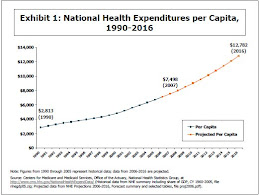The problems with health care in the U.S. have created a flawed system that would be impossible to fix by addressing just one issue. Our current situation is a result of a culmination of advancing technology, unintentional inefficiencies, and the rising cost of living among a host of other issues. If we look at any of these issues individually, we see that each has its own purpose or excuse. Medical universities pride themselves on the amount of money they have to research with. This is indicative of the American obsession with making things better than they were before. In the medical realm, it seems only fitting that our money is spent to find better, more successful methods to aid us in curing others. Of course, this seemingly philanthropic venture requires much more money than one would expect. We see that for each issue that plagues our healthcare system, there is a reason it became the problem that it is.
According to lecture, financing of health insurance coverage of the nonelderly population in 2007 shows that 21% of the federal budget is allocated to Medicare, Medicaid and SCHIP. This large amount of money is spent for approximately 35% of the population while the other 65% relies on private insurers. A scan of the budgets of other developed countries shows that this inordinate amount of money seems even more disproportionate when we look at how little other countries are spending on their healthcare systems. Even with our increased spending, we still lag behind while other countries have seemingly found their solution.
Though some people may dread the prospect of a universal health care system and its association with a “socialist” government, we fail to realize that aspects of our very own healthcare system are based on social health fundamentals. The Medicare system that our elderly population knows and loves is based on the social insurance ideals of large government roles with a centralized financial system. For the population under 65, we view our tax dollars being spent to inevitably help us when we need it. As Jean laid out so well in her blog post, the insurance system, and also Medicare, is based on a combined risk “fund” that can be accessed by everyone who buys into it. Though universal health care seems like a valid option, what remains to be addressed however, is the idea of a fundamental overhaul in the healthcare system already in place in our country. This approach is somewhat idealistic, especially when we consider Obama’s upcoming budget does not mention any hint of health care reform. With time and a systematic approach to solve each of healthcare’s major issues, we can witness a positive reform of our system.
Monday, January 26, 2009
Subscribe to:
Post Comments (Atom)

No comments:
Post a Comment